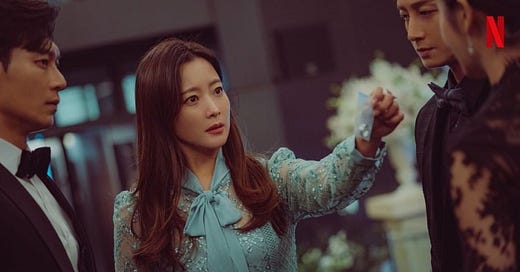It’s been a while since I’ve tackled a makjang and 8 episodes in this instance seemed doable. In the past (at least since Make a Woman Cry) I’ve avoided them like the plague not just because of the over-the-top family dynamics but also for the ridiculously protracted conflicts that mark these types of stories. South Korean soap operas aren’t just insanity on steroids but the breeding ground for all-too-familiar tropes like revenge, birth secrets, amnesia, mistaken identity, illegitimate offsprings, family members wrestling for supremacy for the family business, forced marriages, imposterism etc etc. It used to be a competition among the main networks as to who could cram in the most number of tropes into a terrifying 50 episode drama that would last 6 months. I survived Jang Bo-ri is Here because of the male lead but only just. Despite the incredible ratings, I came away from the experience much wiser about my viewing choices. It’s not to say that I’ve entirely given up on the genre — Money Flower (2017), Lie After Lie (2020) and Flower of Evil (2020) have been decent exemplars of the genre — but I’m certainly keeping my distance from anything that’s more than 20 episodes long. Anymore than that it’s too taxing on my ability to suspend disbelief.
Although I confess to having some aversion to the genre, it’s not hard to see the attraction. Makjangs are morality tales at their core which partly explains their popularity among the tv-watching seniors. The exaggerated plots make them seem like farce or satire but they really function as cautionary fables especially when presented as the relentless lampooning of the conspicuous consumption of the wealthy set. Materialism in all its forms is what’s under attack and the insidious way that it feeds human greed leading to corruption on a societal scale. Remarriage and Desires is really no different in this regard.
Besides there are few things more addictive or entertaining than watching rich people falling all over themselves backstabbing each other. Unless it’s watching rich people get stabbed and trying to watch the usual suspects tell all kinds of porkie pies.
Kim Hee-seon plays Seo Hye-seung, a part-time university lecturer and cram school teacher who is still grieving over the suicide of her late husband who fell prey to the wiles of a colleague and was made the scapegoat of her embezzlement of other people’s money. To add insult to injury the same colleague accused him of coming on to her and other kinds of predatory behaviour thus putting her in the irredeemable female villain category. As Hye-seung gradually picks up the pieces of her life to support herself and daughter in the aftermath, she encounters the femme fatale that brought about her late husband’s downfall at a very exclusive matchmaking agency appropriately called Rex. Hye-seung is there to ask for a refund but changes her mind as soon as she sees the unscrupulous Jin Yoo-hee (Jung Eugene) on the prowl for a top tier rich husband. The vague outlines of a plan for revenge soon forms in Hye-seung’s frustrated mind and is determined to unmask the fraud and prevent her from inflicting herself on any more unsuspecting men. Unfortunately Hye-seung lacks the power and resources to embark on any revenge scheme of substance but catches an unexpected break when she becomes a pawn in someone else’s schemes.
Heading up Rex is CEO Choi Yoo-sun (Cha Yi-jeon) an enigmatic and seemingly matriarchal figure who presides over an entity that brokers marriages between the elites. It’s a position that not only has her rolling in cash but gives her unprecedented access to the politically powerful in the land. A benefit that she takes full advantage of to feather her personal purse. Choo Yoo-sun is an ambitious woman who is not content with living under the shadow of her older domineering husband. Things heat up when she’s asked by two parties to set them up with the most eligible bachelor in her books which turns out to be the immensely likeable IT entrepreneur Lee Hyung-ju (Lee Hyun-uk).
Neither Hyung-ju nor Hye-seung enter the dating game willingly except for concerned mothers who insist that life must go on for their heartbroken offspring. But it does seem obvious that they are the endgame because they do have far more in common with each other than even the CEO of Rex might care to admit. The devil apparently is in the details but Choi Yoo-sun is looking elsewhere — wealth and status profile — rather than in what simple-minded folk think are important in a mate. Hyung-ju isn’t your typical young chaebol CEO. In fact he’s a self-made businessman who’s been very badly burnt by his ex-wife.
In the scheme of things Hye-seung becomes the wildcard in this game that CEO Choi has designed to milk for everything it’s worth. Hye-seung is a variable that allows her to hedge her bets with the scheming Jin Yoo-hee and Assemblyman Son Pil-young’s aide, Go Ae-ran.
Despite the best efforts of the schemers to get their way and roughshod over the seemingly helpless Hye-seung, she manages to garner the interest and protection of two men. One is an old flame from her university days who re-enters her life. The other is the father of a motherless boy she’s tutoring. Even while there’s very little she can do on her own against terrifying forces, her inner resolve and genuine maternal instincts attract the right sort of men to her aid. Her virtue is her greatest asset while her nemesis is a restless evil whose modus operandi is to take short cuts and destroy obstacles to achieve her goals. She may be more cunning and even more resourceful than her adversary but her vices eventually undermine all her best efforts when she’s revealed to be the conniving shrew that she is.
Hye-seung might come across as a damsel in distress but I’m not one of those who believes a woman has to be able to achieve everything on her own to have any credibility. As a matter of fact nobody can. Not even a man. The reality is that her opponent Jin Yoo-hee doesn’t achieve her goals all on her own either and must also rely on others but most especially the father she loathes. Hye-seung is smart enough to set aside what little pride she has to accept help from Cha Seok-jin and Lee Hyung-ju. She knows there’s no way she can take down Yoo-hee at record time on her own. Her currency with the two men who admire and love her is what helps her overcome some of the odds stacked against her. When Hye-seung gains some confidence and bargaining power, she is then able to conduct negotiations based on her own terms. In the end she earns her trump card because she understands that push comes to shove, family comes first.
For those who need to know straight up it is a satisfying tale where good does triumph over evil, where maternal selflessness does triumph over greed.
What’s fascinating here too is that Hye-seung resists remarriage initially. She’s the only person who goes to Rex’s Greek party to reveal The Truth but not to find a potential mate. In the end in spite of putting up some resistance, she’s the winner that takes all. She gets the husband that is highly sought after and gives her daughter a complete family which includes a brother and a new dad.
While the show does take several digs at the fabulously wealthy and the powerful, this is really an allegory about the importance of strong committed families existing upon a solid foundation of marriage. It’s a message which is doubtedly directed at the escalating divorce rates. More than a greedy scheming social climber, Yoo-hee’s most heinous sin is adultery. She’s a destructive force not just for an unsuspecting family but for society at large as seen in her reach. Of course the blame doesn’t entirely rest on her shoulders. She’s also a resentful seething child born out of wedlock who has been ignored and abandoned by a politically ambitious father. And then of course there’s Hye-seung’s husband whose infidelity led him on the path to destruction and leaving his wife to fend for herself. The invective against adultery here echoes the admonishments from the Old Testament book of Proverbs in chapters 5-7. Adultery always has far-reaching ramifications for the community.
What’s equally suggestive is the use of sex here as a cynical weapon/tool by the “bad girl” in the story to lure men into a potentially toxic relationship with her. It’s about control and dominance, not about love. If indeed the villain here is capable of that.
This is why the most heartwarming parts of the show are the few scenes where the two families interact like a whole family or when Hyung-ju’s son Jun-ho responds to Hye-seung’s maternal ministrations. She is quickly positioned as his surrogate mother even before his father falls for her. The two broken families are two halves of a whole. It’s an idealized picture of blended families of course but this isn’t about realism but an instruction manual on the importance of strong two-parent families for children.
So more’s the pity that there aren’t more scenes with Jun-ho and Min-ji (the children) in the larger narrative playing happy families especially because one of the reasons why Hyung-ju finds himself increasingly attracted to the unassuming Hye-seung is her relationship with his son. For a divorced man with a teenage son who misses the presence of his mother, it’s a key emotional anchor. In that regard I wouldn’t have minded an episode or two more to tie all the various threads together more neatly.
Kim Hee-seon has been a familiar name to me since Faith (2012) from all those years ago. She was seen more recently in the afterlife fantasy Tomorrow from earlier in the year. It’s great that there are decent roles for women in her age group in Kdramaland. The biggest revelation to me is Lee Hyun-uk who plays the main male lead here. I remember him from The Good Detective 1 where he had a short but memorable role there and the action thriller Search. He’s immensely likeable in this and thinking about his role choices which are diverse, he is a versatile performer but excels in playing tortured, morally confused characters. Cha Ji-yeong was also very good in last year’s Taxi Driver as one of the show’s villains and Jung Eugene who is not new to playing unlikeable females was lately in Snowdrop.
Remarriage and Desires is a show that I wasn’t expecting much from and ended up enjoying far more than I expected. It’s definitely bingeable and addictive once you get started. It does nothing particularly new (everything’s by the numbers) but with what material there is, the storytelling and performances are enough for a momentary diversion from the mundane.





You consider <i>Flower of evil</i> a makjang ? I might have not understand well what it entice, as this drama did not seemed more outragous than others to me.